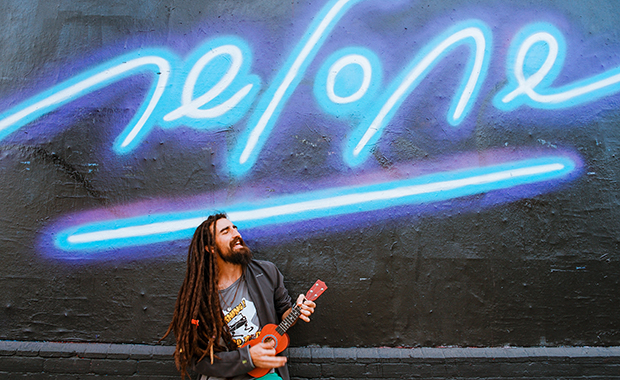Life
12 Blessings From Having A Severe Health Challenge

A few weeks ago I was diagnosed with a health challenge called Fructose Malabsorption and at first, I was quite worried of the change in the quality of life that I was told to expect. Friends started telling me all the things I would no longer be able to eat and the experience shocked me.
Since I have a positive mindset from years of self-development, I thought long and hard about how I could reframe this scenario to be a benefit. It turns out I didn’t need to because the universe gave the answer to me.
Below are the twelve blessings I have discovered from having health challenge:
1. I am now forced to be healthy
Most people try their entire life to be healthy, and it takes a lot of discipline. I have the blessing of having a food intolerance so it means that I can’t eat any junk food what so ever. I don’t know about you, but I think this is an amazing gift I have been given.
I don’t have to worry like most people about peer pressure or fitting in because I have a genuine reason why I can’t consume toxic, processed foods anymore, and I am kind of proud of it. I suspect that my fructose intolerance was caused by years of eating unhealthy food and consuming a ridiculous amount of sugar.
I watched the movie “That Sugar Film” recently and learnt that sugar is actually the main issue with the western diet and that it’s in everything. From yoghurt to tomato sauce, to our favourite breakfast cereal, almost anything we buy that is pre-packaged is likely to contain sugar.
What the movie points out is that often the label doesn’t tell you there is sugar, and the ingredients are given other names so you won’t always know if there is sugar present. By removing fructose foods from my diet, I am forced to not consume these foods anymore.
2. I won’t age as quickly
In today’s society, so many of us care so deeply about our vanity and the way we look. I stopped caring about vanity a long time ago, but I still have the pleasure from my new fructose intolerance to know that the aging process will slow down for me.
So often we think that we inherit baldness, gray hair and poor skin conditions, all the research I have read says that genes play a small part, but the number one factor that actually influences these conditions is our diet.
I am not joking when I say that I have friends (both male and female) that are in their twenties and already have some or lots of gray hair. Some of those same friends are also going bald or completely bald already. I am so happy to know that I am at least slowing this process down without having to do anything at all.
It’s never too late to start to be healthy; I am just lucky that I am being forced.
3. The universe is conspiring in my favour
For some reason, since I have started on this journey of self-development and massive success, the universe has conspired in my favour to bring me this health problem. It’s almost as if the universe wants me to stay on this path and so it’s throwing gifts disguised as challenges, to help me along the way.
I don’t say this to get all spiritual on you, I say this because the actions that we take every day determine our success and things will start to go your way as long as you have the skills and knowledge to understand what’s happening to you.
Had I have not done any personal development at all, I would have never been able to take the point of you that I take on most things today. To summarise this point, everything that looks like a problem is an opportunity – period.
4. I am more patient
Eating healthier foods and knowing what is going into your mouth allows you to become more patient over time. The reason most people are impatient and have to walk around like robots drinking coffee is because their diet doesn’t allow them to operate at a high level of energy.
On your way to the city next time, notice how many people are driving their cars in an angry way and are in a rush. The reason for this is because they have no energy, can’t sleep properly and are tired because their body is exhausted from processing all the fatty food they eat the day before.
When your body has to constantly work hard to process unhealthy food and remove the waste from your system, it uses up all your energy. The body is very clever, though, when there isn’t enough energy available; you’re put to sleep so that while you rest your body can work on breaking down the food.
Low energy levels are one of the main factors to being impatient and thanks to my fructose intolerance I am seeing a decreased level of this phenomenon.
5. I don’t need willpower to be healthy
One of the hardest parts of being healthy is to maintain the habit over a long period of time and not succumb to temptation. I have to admit that I have very good will power and can maintain a habit that is giving me value, but like everyone, even I have my moments.
It can be very tempting when walking past a nice cake store or smelling a fresh pizza that has just been cooked, to give in, and go and stuff our faces with food that we shouldn’t. One of the times we can be most at risk is when we are feeling an extreme emotion like sadness, where food scientifically can make us feel better in the short term.
Think of your body like being a year seven high school science experiment. When you mix different chemicals together in a test tube, you get both positive and negative results. For the human body, when you mix plant-based foods together with a well balanced diet, as opposed to mixing plant-based food with lots of junk food, the end result is completely different.
“Your body is really just a never-ending chemical reaction and you can choose to make the reaction be beneficial or a hindrance in your life”
6. I am now grateful for the past foods I experienced
Before I had this fructose intolerance, I was able to eat absolutely anything I wanted and for a long time I was never grateful for this. It’s amazing how when something is taken away from you, you realise how lucky you were to have it in the first place.
Had this event not happened in my life I would still be going along eating whatever I want and not being grateful for this privilege. There are millions of people that starve every day and have never had the opportunity to eat some of the fine foods that western culture allows us to experience.
While I have eaten my last scoop of ice cream and last slice of pizza, I am grateful that I got to experience them in the first place.
7. Tea has become my new vice
Everybody tends to have a vice, which is a bad habit that they regularly do. A typical vice for most people is coffee or eating junk food. A vice is a way for us to reward ourselves after a busy workweek. Junk food used to be my vice, but this new fructose intolerance has forced me to find a new one.
The new vice I have taken up is tea, which is not really a bad habit and is quite healthy if you drink the right one. I would never have found this healthy vice if I hadn’t had to deal with this food issue. Again, I am blessed to be forced to change my life and form a new healthy habit.
After a long week of work, there is nothing I like more than relaxing over some fresh tea and taking my mind off work. Having something that is a temptation is fine as long as it’s good for you, and tea has been that for me.
8. I now need to look at what’s in my food
Many of us eat foods every day, and we have no idea what the ingredients are. When you have a fructose intolerance, you are forced to question everything you eat and understand what’s in the food you are consuming.
Having a fructose intolerance means that when I’m at the supermarket I look at the ingredients tab of everything, and I have started to become more aware. The result of all of this is that you make better decisions about what you eat which can affect your health for the long term.
It also makes you realise how much processed food you are eating and you start to eat more natural foods. The reason you want to eat more natural food when you have a fructose intolerance is that you know exactly what’s in whole foods like vegetables so there an easier choice.
9. I get to see a dietician
The first thing your doctor does after you are diagnosed with a fructose intolerance issue is send you to a dietician. Let’s be honest with ourselves for a second, most of us are probably not going to go and see a dietician of our own accord because we tell ourselves we’re healthy, and we don’t want to know if the little chocolate indulgences we love are harming us.
The blessing here is that I now have to go and see one and I have someone who I am accountable too. I can’t lie to myself or those around me about what I am eating because I will get found out. The tests I now have to do will reveal everything I am consuming, and whether I am eating what I say I am, so I have the benefit of being able to stay on track.
10. I get to maintain a food diary
After seeing the dietician, I now have to keep a daily food diary. This is another task that most of us don’t have the willpower to do and avoid like the plague. Again, I am accountable now and have to keep track of everything I eat.
It’s great to see after a few weeks what I am actually consuming as opposed to what I tell myself I am consuming every day – there is a big difference….haha.
11. I get reduced medical bills forever
We all spend lots of money over the course of our lifetime on healthcare. Imagine being able to cut those bills down drastically? The blessing I have from this fructose intolerance is that by being forced to be healthy I won’t develop the sicknesses that most people live with on a daily basis.
Being healthier means you don’t need to go and see the doctor as much or spend money on expensive specialists trying to figure out what’s wrong. This translates to less time worrying about what’s wrong with you, less of your time being wasted in medical waiting rooms and more time doing the things you love.
12. I don’t have to take time off work
I have already seen since I have been on a healthy streak for the last two years that I haven’t contracted the flu and I very rarely get colds. The last time I had a cold it lasted for two days. The beauty of my new fructose intolerance is that by cutting out unhealthy foods, my body will be functioning much more efficiently, and my insides will be much less acidic.
When I am working on work-related tasks, I will now be able to think clearer and won’t have the brain fog that most people deal with. This means that the quality of work I produce will be of a much higher standard, and I will become more patient with people because I am feeling good.
The blessing of my fructose intolerance is that I can function a lot longer than most and will have more energy. By not getting sick as much, I will be able to get more work done, take fewer days off work and achieve things that others are not able to do.
I don’t know about you, but I think this new health challenge is one of the best things that has ever happened to me. I am starting to wish it had happened sooner so I could enjoy the benefits I’m now seeing.
If you have dealt with a health problem recently and found some real benefits from it, then please leave a comment below or post on my Facebook Page.
Life
Harness the ‘Battery Effect’ to Transform Life’s Tensions into Your Greatest Strength
Recharge your life batteries by shifting your mindset today

I believe our life capacity is determined by the skillsets we develop on this spinning rock we call Earth. By “life capacity,” I mean our ability to embrace and sustain joy. (more…)
Life
Doing This for 30 Minutes a Day Can Unlock Your Full Potential
Taking just 30 minutes a day to learn something new improved my life

Between the demands of work, life, and the never-ending cycle of bills, we often put our development, learning, and self-improvement at the bottom of our daily to-do lists. (more…)
Life
How Learning the Skill of Hope Can Change Everything
Hope isn’t wishful thinking. It’s a state of being and a skill that has profound evidence of helping people achieve success in life
Life
The 5 Stages of a Quarter-Life Crisis & What You Can Do
A quarter-life crisis isn’t a sign you’ve lost your way; it’s a sign you’re fighting for a life that’s truly yours.

The quarter-life crisis is a well-defined set of stages—Trapped, Checking Out, Separation, Exploration, Rebuilding—one goes through in breaking free from feelings of meaninglessness, lack of fulfillment, and misalignment with purpose. I detail the stages and interweave my story below. (more…)
-

 Startups4 weeks ago
Startups4 weeks ago5 Ways to Financially Support Your Next Big Idea
-

 Success Advice4 weeks ago
Success Advice4 weeks agoThe 5 Ingredients of Success: A Pathway to Achievement
-

 Entrepreneurs3 weeks ago
Entrepreneurs3 weeks agoThe ONE Thing Most Entrepreneurs Forget When Building Their Empire
-

 Entrepreneurs4 weeks ago
Entrepreneurs4 weeks agoIs Your Data Strategy Holding You Back? Here’s How Consulting Options Can Propel You Forward
-

 Startups3 weeks ago
Startups3 weeks agoUnlock Your Potential: 3 Microlearning Apps You Need in 2025
-

 Entrepreneurs3 weeks ago
Entrepreneurs3 weeks agoA Simple Guide to Unlocking Hidden Profits by Leveraging Business Notes
-

 Startups3 weeks ago
Startups3 weeks agoThe Secret Weapon Smart Businesses Use to Stay Ahead
-

 Life1 week ago
Life1 week agoHarness the ‘Battery Effect’ to Transform Life’s Tensions into Your Greatest Strength































10 Comments